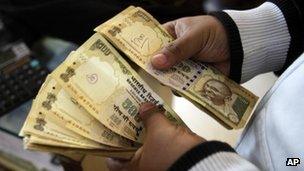Great Reversal and the Fed
- Published
- comments

The Indian rupee has hit record lows
The minutes from the Federal Reserve's meeting show that America's central bankers broadly agree that they should "taper" or cut back their injections of cheap cash later this year if the economy improves. This paves the way for the quantitative easing (QE) programme to end perhaps by the middle of next year.
It doesn't mean that the Fed will withdraw the money that they put into the economy anytime soon or that rates will rise. They even discussed lowering their unemployment target from 6.5% so that rates could stay at 0-0.25% for longer.
There is still uncertainty about when all of this will happen. But the reaction in emerging markets was clear. More money left as the Indian rupee hit a new record low, while the Indonesian rupiah and Thai baht are at their lowest levels since 2009. Asian stock markets have pretty much erased all of this year's gains.
And it's not just affecting Asia but emerging economies around the world. The stock markets of Brazil and India are down more than 20% since the start of the year, while China and Russia have fallen by about 12%.
It started quietly in May when Fed chairman Ben Bernanke first raised the prospect of tapering, and I wrote about the potential impact of the great reversal of cash.
As with most capital outflows, a trickle can quickly become a flood. An estimated one-third of the money invested in the bond funds of the BRICs (Brazil, Russia, India and China) have been pulled out since May. During the same period, nearly $100bn has gone back into US equities.
With more signs of the beginning of the end of the era of cheap cash, investors are looking harder at where to put their money. In the past four years since the global financial crisis, $3.9 trillion has poured into emerging economies. These countries, which had looked attractive because they were growing faster than the sluggish West, now look less so as the US recovers.
It's the old adage: higher returns usually mean higher risk. Emerging economies have grown well, but they are more risky as they are developing countries which have a more volatile growth path.
Vulnerable
The big question is whether these emerging economies can cope when the money leaves.
The most vulnerable are those with the greatest exposure to foreigners owning their debt, since that debt could be sold off which would push up borrowing costs for these countries.
According to HSBC, foreigners own about 40% of Mexico's debt market now, compared with just 2.5% in 2003. For Poland, it is 37% versus 17% then. And, in Indonesia, foreigners hold 30% now, which doubles their holding since 2009.
In absolute numbers, Brazil has most dollar loans at $287bn. But, on a relative scale, Turkey's $172bn of dollar loans equals 22% of the entire economy.
Other countries that are at greatest risk are those with large external deficits to finance. India's current account deficit, the broadest measure of trade including investment flows, is at 4.8% of GDP, while Indonesia's stands at 3.2%. It's unsurprising that their currencies have fallen so dramatically this year.
Again, it's not just in Asia. The rupee is the worst performing currency in Asia, but it jostles with the Brazilian real and the South African rand for the worst performer in the world this year. Both of those countries have struggled to cope with appreciating currencies in the past few years as cheap cash entered their borders. Now, their currencies are declining as the money leaves.
Where could this all end up?
A worst case scenario would be a repeat of the 1998 Asian financial crisis. That's when Asian economies, starting with Thailand, saw their currencies depreciate when "hot money" left their borders, and it ended up with several countries being rescued by the International Monetary Fund. As India and other countries have emphasised, they have foreign exchange reserves that can cover six months of imports, which gives them some protection.
Also, unlike the Asian crisis, this is not a shock development. The Fed was always going to end its QE programme at some point.
Better prepared?
But, here's the most worrying aspect.
The impact of the Asian financial crisis was unexpectedly global. Thailand had too much crony capitalism that ended up generating unsustainable debts that caused investors to leave. Similar problems in other parts of Asia as well as the close trade and investment ties in the region may explain why the money left. However, investors not only pulled their money from there but also from Russia, Turkey, Brazil, and Argentina, which plunged those economies into crisis in the aftermath. Argentina then ended up with the largest sovereign default in modern times in the early 2000s until Greece sort of took that title.
This time around, will investors be more discerning so that just countries with weak fundamentals lose out? Or, are emerging markets still treated largely as one investment class, so when the risk appetite recedes, they all lose?
Most importantly, are emerging economies now better prepared should the money leave?
The answers to these questions will determine whether the great reversal of cheap cash results in a crisis.
This reminds me of those who warn that the solution for the last crisis usually paves the way for the next one. Recall the criticism that the low interest rates that addressed the bursting of the 2001 dotcom bubble fed into the US sub-prime housing bubble. Now, the cheap cash injected to address that crisis may end up contributing to the next crisis - this time in emerging economies.